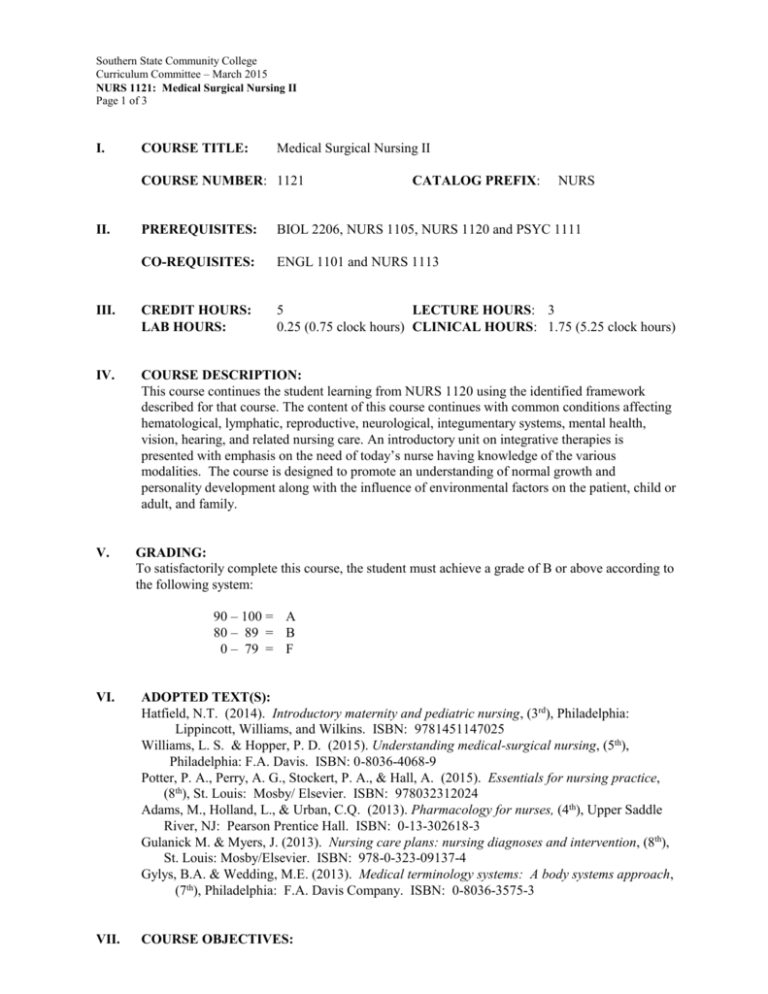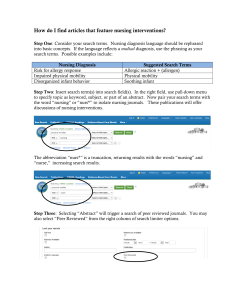
Southern State Community College
Curriculum Committee – March 2015
NURS 1121: Medical Surgical Nursing II
Page 1 of 3
I.
COURSE TITLE:
Medical Surgical Nursing II
COURSE NUMBER: 1121
II.
CATALOG PREFIX:
NURS
PREREQUISITES:
BIOL 2206, NURS 1105, NURS 1120 and PSYC 1111
CO-REQUISITES:
ENGL 1101 and NURS 1113
III.
CREDIT HOURS:
LAB HOURS:
5
LECTURE HOURS: 3
0.25 (0.75 clock hours) CLINICAL HOURS: 1.75 (5.25 clock hours)
IV.
COURSE DESCRIPTION:
This course continues the student learning from NURS 1120 using the identified framework
described for that course. The content of this course continues with common conditions affecting
hematological, lymphatic, reproductive, neurological, integumentary systems, mental health,
vision, hearing, and related nursing care. An introductory unit on integrative therapies is
presented with emphasis on the need of today’s nurse having knowledge of the various
modalities. The course is designed to promote an understanding of normal growth and
personality development along with the influence of environmental factors on the patient, child or
adult, and family.
V.
GRADING:
To satisfactorily complete this course, the student must achieve a grade of B or above according to
the following system:
90 – 100 = A
80 – 89 = B
0 – 79 = F
VI.
ADOPTED TEXT(S):
Hatfield, N.T. (2014). Introductory maternity and pediatric nursing, (3rd), Philadelphia:
Lippincott, Williams, and Wilkins. ISBN: 9781451147025
Williams, L. S. & Hopper, P. D. (2015). Understanding medical-surgical nursing, (5th),
Philadelphia: F.A. Davis. ISBN: 0-8036-4068-9
Potter, P. A., Perry, A. G., Stockert, P. A., & Hall, A. (2015). Essentials for nursing practice,
(8th), St. Louis: Mosby/ Elsevier. ISBN: 978032312024
Adams, M., Holland, L., & Urban, C.Q. (2013). Pharmacology for nurses, (4th), Upper Saddle
River, NJ: Pearson Prentice Hall. ISBN: 0-13-302618-3
Gulanick M. & Myers, J. (2013). Nursing care plans: nursing diagnoses and intervention, (8th),
St. Louis: Mosby/Elsevier. ISBN: 978-0-323-09137-4
Gylys, B.A. & Wedding, M.E. (2013). Medical terminology systems: A body systems approach,
(7th), Philadelphia: F.A. Davis Company. ISBN: 0-8036-3575-3
VII.
COURSE OBJECTIVES:
NURS 1121: Medical Surgical Nursing II, Summer 2016
Page 2 of 3
1. Examine the causative factors of specific health conditions, the signs and symptoms of the
conditions, the diagnostic procedures, and the body responses to medical and surgical
treatment.
2. Plan patient-centered care using clinical judgment and evidence-based nursing standards.
3. Integrate the nursing process as the model for decision-making in the care of patients with
impaired health conditions.
4. Discriminate between safe and unsafe nursing practices in the provision of patient care.
5. Evaluate effectiveness of nursing care based on the outcome of meeting individualized
patient needs.
6. Document nursing care and collected data clearly, timely, and concisely.
7. Support teamwork through the collaboration with other health care providers.
8. Utilize knowledge of ethical and legal principles to guide effective nursing care of patients.
9. Examine the nurse’s role when alternative/complementary therapies are integrated into the
care of the patient.
10. Correlate nursing interventions for specific health conditions with commonly prescribed
pharmacological therapies, their potential effects and outcomes.
11. Demonstrate competency in administration of therapeutic pharmaceuticals and in evaluating
patient response.
VIII.
IX.
COURSE METHODOLOGY:
Lecture-discussion, AV materials, CAI, clinical practice.
COURSE OUTLINE:
The instructor will include the concepts of safety, patient-centered care, clinical judgment,
professionalism, quality improvement and communication while teaching the following topics:
Nursing Care of the Mentally Ill Client
Meeting the Needs of Clients with hematological and lymphatic disorders
Nursing Identification of Needs & Care of the Client with Eye Conditions & Ear Conditions
Nursing identification of needs and care for the female and male client with a reproductive
system disorder
Nursing identification of needs and care for the client with neurological disorders
Needs of the client with glandular and skin disorders
Introduction to alternative/complementary therapies and nursing responsibilities
Sample weekly outline
Week:
1 & 2.
Mentally ill disorders
3 & 4.
Hematological and lymphatic disorders
5 & 6.
Eye and ear conditions
7 & 8.
Reproductive system disorders
9-11.
Neurological disorders
12 & 13. Glandular and skin disorders
14 & 15
Alternative/complementary therapies
X.
OTHER REQUIRED TEXTS, SOFTWARE, & MATERIALS:
All textbooks from prior nursing classes may be used as references in either clinical or classroom.
XI.
EVALUATION:
Theory is evaluated by written examination and assessment of completeness and accuracy of any
additional class related work, including essays, worksheets, quizzes and class participation, as
determined by the classroom instructor. Students will be informed of the specific evaluation tools
NURS 1121: Medical Surgical Nursing II, Summer 2016
Page 3 of 3
and their respective percentage values on the first day of class.
Please note that the student must achieve a grade of satisfactory in each clinical practice objective
and the required score on the required ATI proctored assessment to successfully complete the
course. If a student fails to achieve a satisfactory in clinical practice or the required score on the
ATI proctored assessment, regardless of lecture grade, the student will receive a grade of “F” for
the course.
Clinical practice is evaluated by student knowledge and application of that knowledge in the
clinical setting and in clinically related written work. Students are to demonstrate progress toward
course objectives as evidenced by specific behaviors noted in the clinical evaluation tool for this
course.
Use of ATI will be directed per the standardized testing policy.
PN Pharm ATI: Students must pass the ATI at a Level 2 or 3 to successfully complete this course.
The student will have 2 attempts to do so. The student must bring a practice exam with a score of
90% in order to be eligible to sit for the ATI exam.
PN Comprehensive Predictor ATI: The student must achieve a Predicted Probability of Passing
NCLEX-PN on the First Attempt of 95% or higher. A sample of the results for PN
Comprehensive Predictor is noted below. The findings will be located on the top right side of the
results. The target Predicted Probability of Passing NCLEX-PN on the First Attempt will be
identified on the second and third lines of the results.
Adjusted Individual Total Score: 74.7%
Predicted Probability of Passing
NCLEX-PN® on the First Attempt: 95%
Mean - National: 71.0%
Mean - Program: 71.2%
Percentile Rank - National: 69
Percentile Rank - Program: 69
Instructors reserve the right to modify timing of exams or presentation of units to meet class
objectives.
XII. SPECIFIC MANAGEMENT REQUIREMENTS: None
XIII. OTHER INFORMATION:
FERPA: Students need to understand that your work may be seen by others. Others may see your
work when being distributed, during group project work, or if it is chosen for demonstration
purposes.
Students also need to know that there is a strong possibility that your work may be submitted to
other entities for the purpose of plagiarism checks.
DISABILITIES: Students with disabilities must contact the Disabilities Service Office at
800.628.7722 or 937.393.3431 before arrangements can be made for them in the classroom or
clinical setting.







